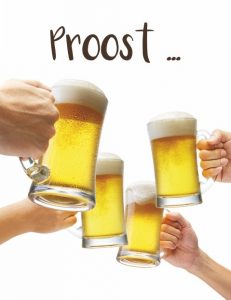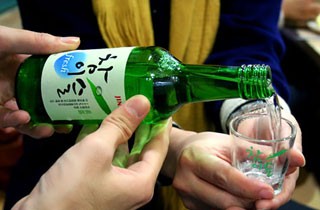 Ever wondered if there are any drinking etiquettes around the world? Although countries around the world may differ in language, customs and history, there is definitely one thing that tends to bring everyone together in harmony – that is a tasty alcoholic beverage! The meaning of cheers is to express good wishes. In wedding party, the best man gives a speech and then people say cheers before sipping wine/liquor. Cheering is about wishing the couple a happy and prosperous married life. People clink glasses to raise a toast for celebrations; other occasions like engagement, bachelor’s party, job promotion, getting a job, graduation, birthdays and these days even just a get-together people toast cheers before starting a party. People clink glasses as a symbol of friendship/togetherness. Clinking means we are all collectively in the happy event to wish good luck to the host/each other in the party. Clinking also means respecting the alcohol in the glass!
Ever wondered if there are any drinking etiquettes around the world? Although countries around the world may differ in language, customs and history, there is definitely one thing that tends to bring everyone together in harmony – that is a tasty alcoholic beverage! The meaning of cheers is to express good wishes. In wedding party, the best man gives a speech and then people say cheers before sipping wine/liquor. Cheering is about wishing the couple a happy and prosperous married life. People clink glasses to raise a toast for celebrations; other occasions like engagement, bachelor’s party, job promotion, getting a job, graduation, birthdays and these days even just a get-together people toast cheers before starting a party. People clink glasses as a symbol of friendship/togetherness. Clinking means we are all collectively in the happy event to wish good luck to the host/each other in the party. Clinking also means respecting the alcohol in the glass!
There is a legend behind the practice of cheering, it goes like this: a big group of pirates after ransacking big loot, assembled and shared barrel of liquor. They divided the loot among themselves. In order to reduce the number of persons getting a share, some of the drinks were poisoned by one of the fellow pirates. As a solution to save from the poisoning, the pirates started a tradition of slamming the mugs hardly against each other. Those days’ people used wooden mugs. So the vigorous slamming of wooden mugs resulted in spilling of liquid from one glass to another. If any of the glasses were to be poisoned, all of them would die.
Afrikaans and South Africans wish “Gesondheid” which is pronounced as Ge-sund-hate it means “to your health”. Afrikans certainly enjoy company of well mannered drinkers.
Chinese: wish “Gan bay” which means cheers. You may find your place set with three glasses. One is for the drink of your choice; one for wine; and one for shots. Do not fill your own glass but do fill those of people more senior than you up to the brim. The Chinese enjoy multiple toasts over a meal. If you are an honored guest, are toasted, you should toast your host in return. Touch the other person’s glass with yours as a sign of respect. For subsequent toasts when there are several people present, glasses are banged on the table.
Czech: In Czech Republic you find a portfolio of some of the finest Italian wines and beer available. Before having beer or wine, you must learn how to say cheers in Czech so you can mingle with the locals and toast to each other. You must learn to say “Na Zdravi”(pronounced as nah z-drah-vee) before you can start enjoying your drink, it’s important to give cheers to everyone at the table as you make eye contact with them. These people believe in an omen of 7 years of bad luck or 7 years of bad married life if you don’t follow this guideline.
Dutch: Luckily it’s fairly simple. Dutch men toast by clinking their glasses or bottles and saying “Proost” (to your health). However, it’s important to look at your drinking companion in the eye just as your glasses clink.
French: Instead of saying ‘cheers’ while toasting, the French wish each other good health or ‘Santé.‘ You will typically hear this word along with a clink of the drink glasses. Even in France, the very first important step is to always look in the eyes of the person you are toasting. There is a belief that any person who does not exchange this glance during a toast will suffer from seven years of bad married life or seven years of bad luck.
Russia: Vodka shots should be downed in one sip; it’s considered bad form to put down a glass that still contains alcohol. Put empty bottles on the floor, not the table. In Russia it is considered hospitable to offer a shot of vodka to start a meeting and it’s polite to accept it. Drinking in Russia is seen as a bonding activity, even in business. It’s a way of building trust and breaking down barriers. The Russians wish each other “Tvoyo zdorovyee/Vashe zdorovye” (let’s drink for health and wellbeing).
Japan: Cheers is mandatory in Japan, it is considered rude to start drinks before everyone has started. The simplest way to say cheers in Japanese is “Kanpai.” This can be translated as “cheers”. Drinking sessions can sometimes go for hours until someone finally relents or passes out. Luckily, the few rules of Japanese drinking etiquette are simple: be a team player, cut loose without fear, and help others feel comfortable doing the same. Most importantly, never cause someone to feel embarrassed.
Germany: When toasting, it is important to maintain eye contact as a sign of trust. If your eye-contact is not firm you are considered shifty or dishonest. Touch all the glasses you can reach with yours while toasting and fix your gaze on each individual as you do so. You clink glasses with your friend and utter a hearty “Prost!”. Never fail to make a firm eye contact while you clink your glass with other.
Denmark: While living in Denmark, you should know the Danish way of drinking alcohol. “Skål” is the first thing we hear on a Danish party or a dinner. This is a word known in all Scandinavian countries. Skål is a toast to goodwill and friendship. By saying this at a moment of rising glasses, the Danes wish you a good fortune and a good health. Historically skål is connected with the God Viking in Denmark.
South Korea: Their etiquettes are similar to Chinese and Japanese. They say “Geonbae” meaning toast to your health. The most senior people in the group are served first and you should never help yourself, although you can refill the glass of someone more senior, provided theirs is empty (don’t ‘top up’ here). If someone is serving you, hold the glass with both hands. Bear in mind that your glass will be refilled as soon as you drain it. Koreans also believe in emptying their glass in a shot.
Argentina: With some of the best wine in the world, Argentina is known for its toasts. “Like many other Spanish-speaking countries, Argentineans conclude their toasts with “Salud.“
Belgium: Belgians have a particular style of toasting. They raise their glass during the verbal toast and say santé, and then raise the glass a second time while exchanging glances with others at the table before drinking.
Hungary: Never clink glasses together when drinking beer. This is a throwback to 1849, at the end of the revolution against the Habsburgs, when 13 Hungarian martyrs were hanged as Austrian soldiers drank beer and clinked glasses. Hungarians vowed not to clink beer glasses for 150 years and some still observe the tradition…..
Sweden: People cheer by saying “Skawl”. The host or hostess will say ‘welcome’ and it’s only after this toast that you should drink your wine. The host, or the most senior person present, will make the toast and after glasses have been raised, men traditionally will wait until women have put their glasses down before replacing theirs. If you are a woman, failing to put your glass down and getting straight into a long conversation while clutching it can be embarrassing for men around the table, who will be left holding their own glasses up.















































